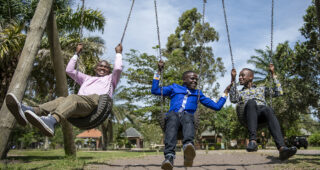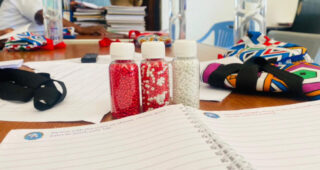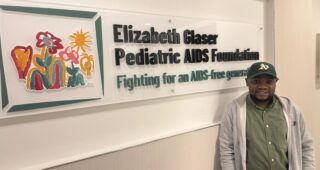Youth Counselors Help Their Peers with Medicine and Encouragement During Quarantine
 COVID-19 has rapidly changed the routines of frontline health workers around the world. Peter Ngambenawe and Ismail Harerimana are youth peer counselors at Kabale Regional Referral Hospital in southwest Uganda. They help link children and adolescents living with HIV to treatment and provide psychosocial support, making sure that they adhere to treatment.
COVID-19 has rapidly changed the routines of frontline health workers around the world. Peter Ngambenawe and Ismail Harerimana are youth peer counselors at Kabale Regional Referral Hospital in southwest Uganda. They help link children and adolescents living with HIV to treatment and provide psychosocial support, making sure that they adhere to treatment.
“Peter and I grew up in this very community,” says Ismail. “We got treatment as children here and were in the Ariel Clubs supported by the Elizabeth Glaser Pediatric AIDS Foundation (EGPAF) and USAID. “Now we are peer leaders. The young people we work with are our friends and colleagues.”
“We are friends,” says Peter. “It’s a family here, and our team is a darling team.”
“At the beginning of the epidemic, we worried about how we would make deliveries, and at first we took some refills to some of the children who live far away,” says Peter. “But the Ugandan government halted such deliveries.” (This was done to reduce social contact and reduce the spread of the coronavirus.) “As soon as the new guidelines came, all of us peers began working remotely.”
Peers began helping to facilitate pick up or delivery of medication according to coronavirus safety regulations.
 “Our drug refill day is Thursday, so on Wednesday we call every single person [who needs a refill] and ask them whether they will come, and we negotiate different options. For example, we ask children, ‘Can daddy come on a bike [to pick up medicine]’ or ‘Is there a trusted boda boda guy who can come?’” says Ismail. Boda bodas are motorcycle taxis that normally line the roads throughout Uganda. During the national shutdown they cannot take passengers, but they can ferry cargo.
“Our drug refill day is Thursday, so on Wednesday we call every single person [who needs a refill] and ask them whether they will come, and we negotiate different options. For example, we ask children, ‘Can daddy come on a bike [to pick up medicine]’ or ‘Is there a trusted boda boda guy who can come?’” says Ismail. Boda bodas are motorcycle taxis that normally line the roads throughout Uganda. During the national shutdown they cannot take passengers, but they can ferry cargo.
“We are giving multi-month drug refills to keep clients safe,” Ismail continues.
The children and youth Peter and Ismail worry about most are those who are in the farthest areas. “For those [individuals], we locate the closest facility, call ahead, and connect the client to get their medication. And we [keep track of] them until we ensure they have received care and are back home,” says Ismail.
Peter says that confidentiality remains important during this process. Adolescents and children living with HIV have a right to privacy regarding their HIV status, so it is important to be careful about establishing delivery.
Unfortunately, COVID-19 has already become stigmatized, and some people are worried that others might think that they have the virus. Peter says that he is worried that this might cause some of his peers to not seek care. He has bad memories of battling drug-resistant TB as a child, and worries that some people with TB symptoms may fail to seek treatment because of stigma about COVID-19.
This is a mental health thing. Our friends are anxious that they will be the first to be affected by COVID-19.
“It’s not only about medicine,” says Ismail. “This is a mental health thing. Our friends are anxious that they will be the first to be affected by COVID-19. So we are using a lot of social media to keep ourselves and our peers encouraged and up-to-date with COVID prevention.”
Team EGPAF
Uganda
Adolescent Identification, Care & Treatment; Community Mobilization; COVID-19



